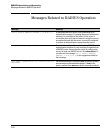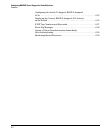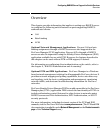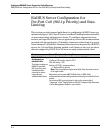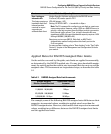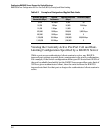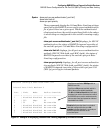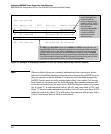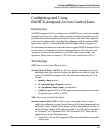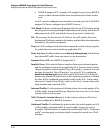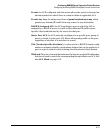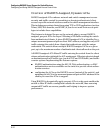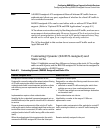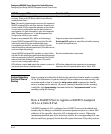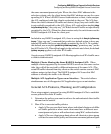
Configuring RADIUS Server Support for Switch Services
RADIUS Server Configuration for Per-Port CoS (802.1p Priority) and Rate-Limiting
ProCurve(config)# show qos port-priority
Port priorities
Port Apply rule | DSCP Priority Radius Override
---- ----------- + ------ ----------- ---------------
B1 Priority | 3 No-override
B2 No-override | No-override No-override
B3 No-override | No-override No-override
B4 DSCP | 001010 2 5
B5 No-override | No-override No-override
B6 No-override | No-override No-override
Priority in the Apply Rule
column indicates a non-
default CoS (802.1p)
priority configured in the
switch for port B1. The 3 in
the Priority column shows
the actual value
configured. No-override
indicates that there is
currently no RADIUS-
imposed CoS priority
affecting the port.
The DSCP in the Apply Rule column and the 001010 in the DSCP column indicate a non-
default CoS (802.1p) priority configured in the switch for packets with a Diffserv codepoint
of 001010 inbound on port B4. The 2 in the Priority column shows the CoS priority most
recently configured for application to packets with that codepoint. The 5 in the Radius
Override column indicates that there is currently at least one authenticated-client session
on port B4, and that the most recent RADIUS-imposed CoS priority for the port is 5, which
overrides the configured DSCP setting. See also the following Note.
Figure 6-2. Example of Displaying Inbound CoS (802.1p) Priority Imposed by a RADIUS Session
Note Where multiple clients are currently authenticated on a given port where
inbound CoS and Rate-Limiting values have been imposed by a RADIUS server,
the port operates with the inbound CoS priority and rate-limit assigned by
RADIUS for the most recently authenticated client. Any earlier CoS or rate-
limit values on the same port for authenticated client sessions that are still
active are overwritten by the most recent RADIUS-imposed values. For exam-
ple, if client “X” is authenticated with a CoS of 5 and a rate-limit of 75%, and
client “Y” later becomes authenticated with a CoS of 3 and a rate-limit of 50%
while the session for client “X” is still active, then the port will operate with a
CoS of 3 and a rate-limit of 50% for both clients.
6-8



